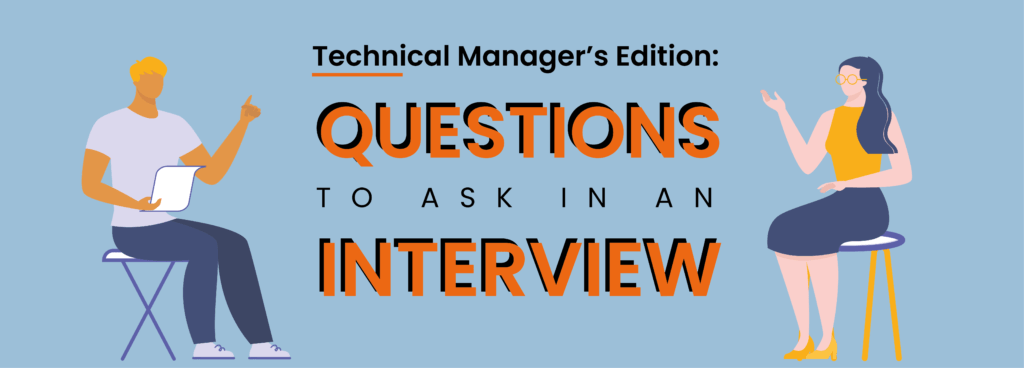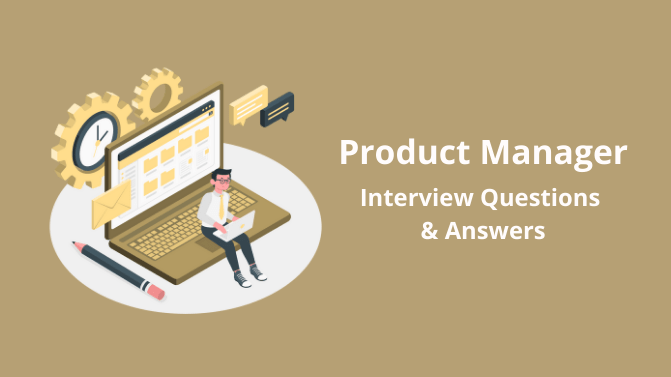Technical Manager’s Edition: Questions to ask in an interview

An interview can be stressful for both the interviewee as well as the interviewer. It is obvious for interviewees to spend hours preparing for their dream jobs. However, if you prepare some good questions to ask in an interview as an employer, it will help you in accessing the candidate effectively and prevent you from making a wrong hire or missing out on good talent.
In case you are a Technical manager new to conducting interviews, you might already be wondering how to interview a candidate and figure out their capabilities and aptness for the role in a limited time.
To begin with, figure out which crucial technical and soft skills you need to assess for this role. Also, to find the right fit, you need to understand their motivations and alignment with the company’s goal and values. An ideal way would be to ask at least one question to evaluate each skill.
In this article, we will tell you what questions to ask in an interview as an employer to hire the best talent for your team.
Discover Their Motivations
Talent alone does not define performance, but motivation does. Highly motivated employees are always ready for challenges and put their best efforts to achieve results. The below questions help you in getting a deeper understanding of the candidate’s motivations.
1. How will this job help you achieve your personal and professional goals?
The most talented and efficient employees are goal-oriented, purpose-driven and self-reflective. They are often good at identifying and setting their goals. The answer to this question will throw light on their ability to not just reach goals assigned to them, but how they set goals for themselves and achieve them.
A good candidate would already have assessed the job description well and contemplated how the role matches with their goals. They will be able to tell you some of their goals and how the job will help them pursue these goals.
2. What is the best thing about your current or last position?
Through this question, you can understand what the candidate values, things that motivate them and are important to them. You can also learn a lot about the type of work they have done, the kind of work relationships they have had, and their achievements at work.
3. How will you summarize the last five years of your career?
While traversing through their recent career graphs, great candidates will not only highlight their success but also the challenges, and how they handled them or failed at them.
While this is an open-ended question, look for points in their answer which determine how they navigate through different situations, reasons for which they join or leave companies, and how they make big decisions.
Also, you will learn how their career has progressed during these years, e.g a developer being promoted to tech lead or a tech lead being promoted to technical manager.
4. What do you want to do differently in your next role?
This is an excellent question to discover the candidate’s motivations, aspirations, expectations and commitment linked to the new role.
The answer to this question will reveal whether or not their aspirations match your organisation’s goals and how they plan to thrive at work and not just survive.
5. What motivates you to join us?
Through this question, you can understand the candidate’s source of motivations and how well they align with the job description.
The ideal person for the role would be self-aware to know what drives them towards this role and what impact it will have on their career goals. They would have done their research to comprehend the role and the company’s values and goals.
Find Out If They Are Fit For The Role
Every role requires a different set of capabilities. For instance, when hiring for a tech lead or a technical manager, you might be looking for management skills alongside technical skills.
Through this set of questions, you can evaluate the candidates based on the essential traits required for the position you are hiring for.
1. Consider me a layman in technology ‘X’. Can you explain it to me in simple terms?
This is a great question to assess the candidates’ communication skills as well as to learn how well they can work within cross-functional teams. This is even more important if you are hiring for an IT project manager or tech lead role.
A Technical Manager having exceptional technical and management skills can come down to nothing if s/he can’t effectively communicate technicalities to non-technical colleagues. Some points to look out for are whether or not they can avoid technical terms and jargon while talking to a non-tech person. And if they can efficiently break down a complex process and explain it in simple terms.
2. Why are you a good fit for this job?
A good candidate should fully understand what the job entails and what experience and skills make them fit for the role.
This is a straightforward question to know about the candidate’s strengths, skills and qualifications that would make them ideal for the job. You will also learn about their unique skill(s) that set them apart from the others and the confidence they have in themselves for this role.
3. Describe your process of getting work done. How do you ensure things are done smoothly?
Every person follows a different methodology for getting things done. And a process-oriented team member should be productive by achieving more in less time. By asking a candidate their working process, you can understand how well they will gel with the team culture and with their reporting manager.
When they describe their process, check for the 5P’s:
- Purpose – Why do they follow that particular methodology.
- Plan – How do they plan to get things done.
- Process – What steps exactly they take to complete tasks successfully.
- Persistence – How they deal with failures or unprecedented events.
- Persuasion – How well can they get others involved in helping them with tasks.
4. What kind of role do you play in your current team?
By asking the candidate about their role in the current or previous team, you will get an insight into how their previous or current employers viewed them and what responsibilities were assigned to them.
Pay attention to their answers and figure out the following things: were they in charge of any projects, or did they play only a supportive role. Whether they had any direct reports or they worked standalone and how well did they interact with the fellow employees.
Working With Others
Every technical role requires working in a team. Thus, you must ask questions related to teamwork to the interviewer.
1. When conflict arises in a team, how do you handle it?
Conflicts are bound to arise while working in a team. In case you are hiring for an IT manager or a tech lead, their ability to deal with conflicts in a team becomes even more crucial.
The answer to this question gives you an understanding of the candidate’s interpersonal skills and personality, and their ability to identify and resolve conflicts at work.
2. What qualities do you think are essential for working in teams?
The qualities they would mention are likely those that they possess and also value in others. Based on the job you are hiring for, pay attention to what essential skills they mention for working in teams.
3. Tell us about the best and worst managers you have worked with? What qualities did you like or dislike in them?
You are bound to come across interesting answers like how the ‘best manager’ helped them in their career growth or how the worst manager made their work-life stressful and hampered their growth.
Focus on the best manager part to discover how you can bring out the best in this candidate. Also learn what traits in a manager do they strongly condemn, for instance micromanaging, poor communication, etc.
Self Awareness and Resilience
Failures don’t hold back people, but their inability to recognise and overcome their weakness and the cause of failures does. The fast-paced corporate culture requires employees to be self-aware and resilient. And the below question helps you gauge those qualities in the interviewee.
1. Can you tell me about an instance where you received critical feedback that was too difficult to hear? How did you process that information and use it to improve yourself?
Through this question, you can get a glimpse into the candidate’s response to harsh feedback and how they use this criticism to be a better version of themselves. The way they answer will reflect on how they see themselves and how they wish others to perceive them. A person who shows self-reflection and resilience would be an ideal fit for a team.
You will also learn about their humility and vulnerability, the areas they might need to improve, and how they overcome their weaknesses.
2. What is your greatest strength?
By asking the interviewee about their strengths, you will understand how self-aware they are, and how they can specifically contribute to this role. A good candidate will be able to tailor their response according to the team’s and role’s goals and requirements. This also means they would have done their homework to learn about the company and also reflect on their strengths.
3. Tell me about a failure or a mistake you made at work that had drastic consequences. How did you overcome it and what did you learn from this experience?
Resilience is an important skill you should be looking for in candidates. This question will tell you how well they are equipped with overcoming failures.
An ideal candidate should answer authentically without hiding their mistake, taking responsibility for what happened and then mentioning their takeaways from this situation.
They might also tell you what they did exactly to bounce back from this setback.
While evaluating the interviewee’s answer, see if they are speaking honestly and comfortably about their mistake and whether they have reflected and applied their learnings.
If you have read so far, you definitely know how to interview a candidate. Also, towards the end of the interview, do allow some time for the interviewee to ask you questions. This will be beneficial to the applicants but will also give you a clue about what matters to them.
Backend Technology Interview Questions
C Programming Language Interview Questions | PHP Interview Questions | .NET Core Interview Questions | NumPy Interview Questions | API Interview Questions | FastAPI Python Web Framework | Java Exception Handling Interview Questions | OOPs Interview Questions and Answers | Java Collections Interview Questions | System Design Interview Questions | Data Structure Concepts | Node.js Interview Questions | Django Interview Questions | React Interview Questions | Microservices Interview Questions | Key Backend Development Skills | Data Science Interview Questions | Python Interview Questions | Java Spring Framework Interview Questions | Spring Boot Interview Questions.
Frontend Technology Interview Questions
HTML Interview Questions | Angular Interview Questions | JavaScript Interview Questions | CSS Interview Questions.
Database Interview Questions
SQL Interview Questions | PostgreSQL Interview Questions | MongoDB Interview Questions | MySQL Interview Questions | DBMS Interview Questions.
Cloud Interview Questions
AWS Lambda Interview Questions | Azure Interview Questions | Cloud Computing Interview Questions | AWS Interview Questions.
Quality Assurance Interview Questions
Moving from Manual Testing to Automated Testing | Selenium Interview Questions | Automation Testing Interview Questions.
DevOps and Cyber Security Interview Questions
DevOps Interview Questions | How to Prevent Cyber Security Attacks | Guide to Ethical Hacking | Network Security Interview Questions.
Design Product Interview Questions
Product Manager Interview Questions | UX Designer Interview Questions.
Interview Preparation Tips
Strength and Weakness Interview Questions | I Accepted a Job Offer But Got Another Interview | Preparation Tips For the Virtual Technical Interview | 7 Tips to Improve Your GitHub Profile to Land a Job | Software Engineer Career Opportunities in Singapore | What can you expect during a whiteboard interview | How To Write A Resignation Letter | Recommendation Letter Templates and Tips.
Quick Links
Practice Skills | Best Tech Recruitment Agency in Singapore, India | Graduate Hiring | HackerTrail Litmus | Scout - Sourcing Top Tech Talent in ONE Minute | About HackerTrail | Careers | Job Openings.





